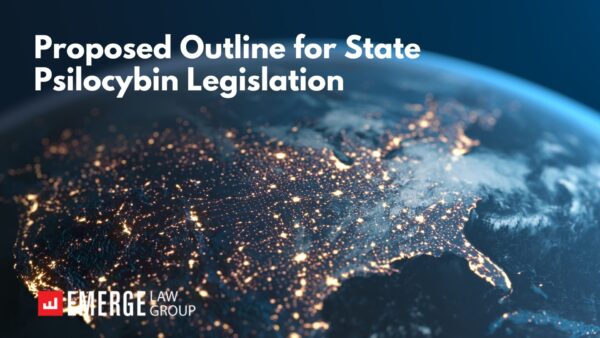This blog is the second in a series of substantive explanations of Oregon Measure 109 that we will publish before Election Day. The complete text of Measure 109 can be found here.
This blog will discuss Measure 109’s regulatory and licensing structure.
The Oregon Health Authority (the “OHA”) is the agency that will implement and carry out Measure 109. The OHA was an obvious choice to regulate psilocybin services given the purposes of both the OHA and Measure 109. By statute, the OHA has direct supervision of all matters relating to the preservation of life and health of Oregonians. The purposes of Measure 109 include: (i) educating Oregonians about the safety and efficacy of psilocybin in treating mental health conditions; (ii) reducing the prevalence of mental illness in Oregon; and (iii) improving the physical, mental, and social well-being of Oregonians.
The OHA’s powers and duties relating to Measure 109 are broad and will include:
• Publishing and distributing to the public available medical, psychological, and scientific studies and research relating to the safety and efficacy of psilocybin in treating addiction, depression, anxiety disorders, end-of-life psychological distress, and other mental health conditions;
• Regulating the manufacturing, delivery, and sale of psilocybin products and the provision of psilocybin services;
• Issuing, renewing, suspending, and revoking licenses;
• Adopting, amending, and repealing rules to carry out Measure 109; and
• Imposing civil penalties for violations.
During Measure 109’s two-year development period, a newly-created Oregon Psilocybin Advisory Board will be established within the OHA to advise and make recommendations to the OHA.
Measure 109 provides for four different types of licenses:
1. Manufacturer;
2. Service Center Operator;
3. Facilitator; and
4. Laboratory.
A manufacturer license will be required to manufacture psilocybin products. The term “manufacturing” includes planting, cultivation, growing, harvesting, production, preparation, propagation, compounding, conversion, processing, packaging, and labeling. Unlike the Adult and Medical Use of Cannabis Act (ORS Chapter 475B), there will be no separate processor license. Rather, the OHA will designate different types of manufacturing activities, each of which will require a particular endorsement. A manufacturer may only engage in a type of manufacturing activity if the manufacturer is issued an endorsement for that type of manufacturing. A single manufacturer license may include multiple endorsements. A manufacturer license will be valid for only one specific location.
A service center operator license will be required to operate a psilocybin service center. A service center is the establishment at which a client will purchase, consume, and experience the effects of a psilocybin product under the supervision of a facilitator. Like manufacturers, a service center operator license will be valid for only one specific location.
A facilitator license will be required to facilitate psilocybin services. Psilocybin services are the services provided to a client before, during, and after the client’s consumption of psilocybin, including a pre-consumption preparation session, an administration session (which must occur at a service center and at which the client consumes and experiences the effect of a psilocybin product), and a post-consumption integration session. Unlike manufacturers and service center operators, a facilitator license may only be issued to an individual (as opposed to a legal entity, such as a corporation or limited liability company). In that sense, a facilitator license will be a personal professional license, not unlike the licenses of many health care and other professionals. Facilitators will have to complete education and training courses, will have to pass an examination approved and administered by the OHA, and will be subject to a professional code of conduct. A facilitator license will not be limited to any one location.
A laboratory license will be required to test psilocybin products. Psilocybin products must be tested at a licensed laboratory before they are transferred by a manufacturer to a service center. Laboratories must be accredited by the OHA before they are licensed. Like manufacturers and service center operators, a laboratory license will be valid only for one specific location. However, it is possible for a person to hold both a manufacturer license and a service center operator license at the same location.
Measure 109 places the following restrictions on the ownership of manufacturer businesses and service center operator businesses:
• An individual may not have a financial interest in more than one manufacturer;
• An individual may not have a financial interest in more than five service center operators;
• If a legal entity holds a manufacturer or a service center operator license, more than 50% of the shares, membership interests, or other ownership interests of the legal entity must be held, directly or indirectly, by one or more individuals who have been Oregon residents for two or more years; and
• If an individual holds a manufacture or a service center operator license as a sole proprietor (which would be inadvisable but possible), the individual must have been an Oregon resident for two or more years.
To be a facilitator, an individual must have been an Oregon resident for two or more years.
The residency requirements for manufacturers, service center operators, and facilitators apply only for the first two years following the two-year development period and expire on January 1, 2025.
Finally, the OHA will have the right to: (i) require that a licensee or applicant submit to the OHA the name and address of each person that has a financial interest in the business operating or to be operated under the license; and (ii) require that each individual listed on the license or application submit fingerprints to the OHA for a criminal records check.
More blogs about Measure 109 will follow in October as Election Day approaches.
If you have questions concerning Measure 109 or any other laws involving psilocybin, entheogenic plants, or psychedelics in general, please contact attorneys Dave Kopilak, Kathryn Tucker, Sean Clancy, Kaci Hohmann, or Kaitlyn Dent from our Psychedelics Practice Group.




